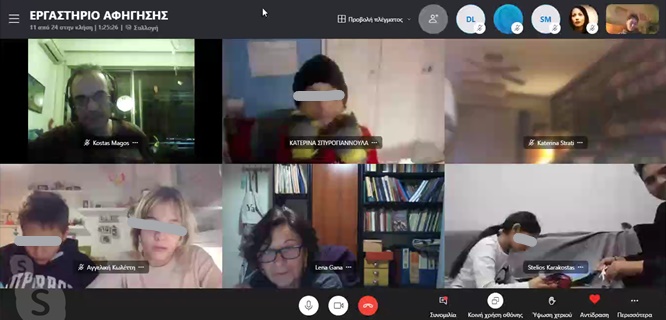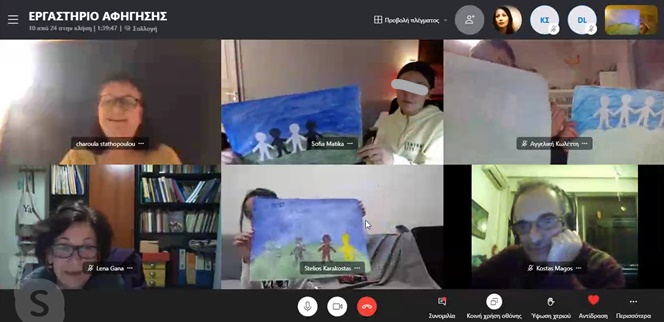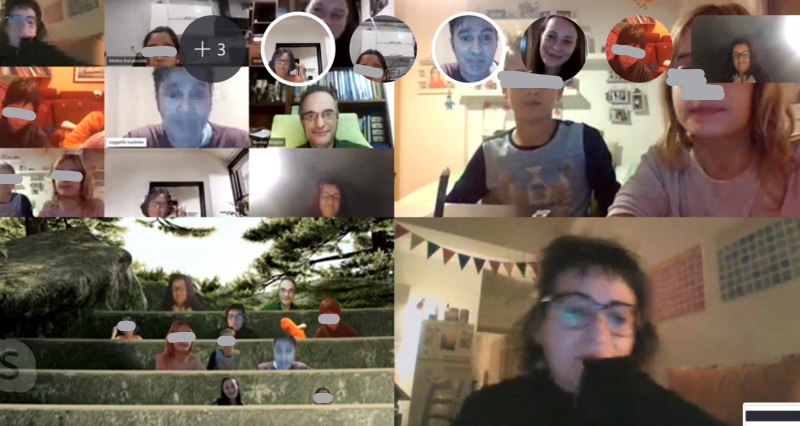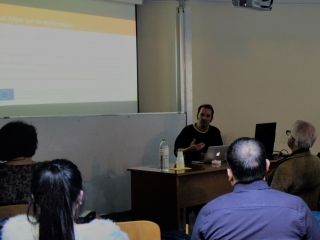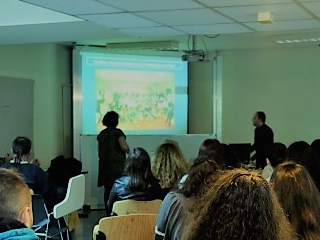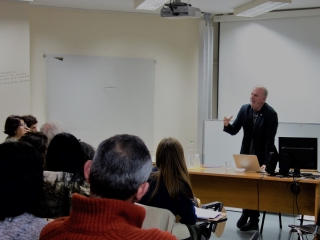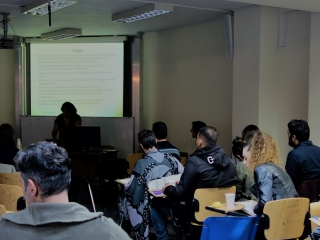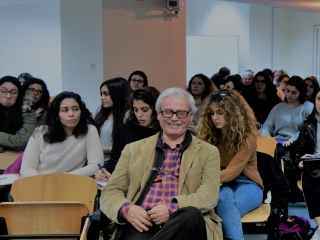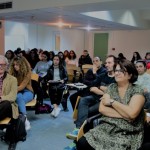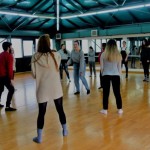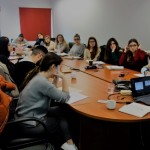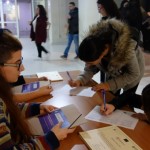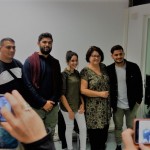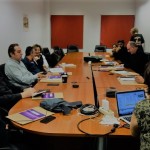Common space with Roma & non-Roma parents and students in Greece
- Written by Cospirom Administrator
- Published in Roma & non Roma (Students & Parents)
- Permalink
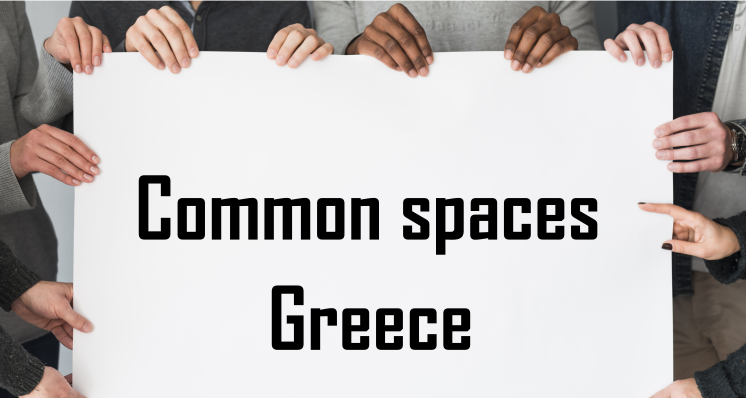
The purpose of the ten two-hours workshops was to create common places between Roma and non-Roma parents and children through the use of narratives. The narratives function as a bridge of intercultural communication and exchange, where the participants discover the common places both between their views and especially between their personal experiences. In such a context, narratives are cultural crossroads that contribute to the development of intercultural approach and empathy.
The narrative workshops were designed to take place live in a common space, the school of the neighborhood, where Roma and non-Roma parents and children often meet. The workshops were designed by members of the university community of the University of Thessaly in collaboration with animators working with Roma and non-Roma parents and children.
After the implementation of the first two live workshops (February 2020), due to quarantine of COVID, the remaining eight workshops were conducted digitally (December-January 2020) via Skype.
The following is a brief description of the content of each workshop:
In the first workshop, which was also a knowing each other workshop, it took place live and had as its core narratives related to the school experience of Roma and non-Roma parents and students. The narrations were mainly made by the parents and highlighted important points of convergence between the two groups regarding the expectations from the school, the problems faced by the students, the margins of cooperation between Roma and non-Roma families, as well as the development of friendly relations between Roma and non-Roma students.
The second workshop focused on narratives related to the place of living. Given that this area is facing degradation issues, the narratives highlighted both the commonalities (area upgrades, cleanliness and safety issues, creation of playgrounds) and the differences between the two groups, which are related to different cultural perceptions, but also to stereotypical views that emerge in the speech mainly of the members of the dominant group.
The third workshop went digital and focused on narratives related to the quarantine experience. As the narratives show, the experience of incarceration, in the context of quarantine, was common in terms of feelings and thoughts, for all, Roma and non-Roma, adults and minors. Fear of illness and loss, emotional load due to inclusion, uncertainty about the future were key elements of the narratives of adults and adolescents. The younger children, although they also experienced the condition of isolation and confinement, through their narratives they mainly showed pleasant moments of creativity through play and reading books.
The fourth workshop as it took place on Christmas Eve had as its core narratives about the holidays. Both the diversity of this year’s Christmas due to the pandemic and older pre-quarantine festivities were an important part of the story. Due to its subject, this workshop gave more time and speech to the younger children, Roma and non-Roma, who through stories and drawings described the holidays as they would like them to be, but also the plans they made for pleasant activities at home during the holidays.
The fifth workshop had as its core the musical narratives. Each participant ‘dedicated’ a favorite piece of music to the others, explaining to others the ‘why’ was their favorite. The music tracks and songs that were heard and the crossroads that existed between them served as an intercultural bridge between Roma and non-Roma participants. At the same time, this workshop highlighted music and song as a common place among the participants. This determined the design of the next three workshops.
In the sixth workshop, one of the animators told two stories, in the form of a fairy tale, about the discovery and creation of music by the first humans. Participants talked about their relationship with music and musical instruments. The participation of Roma and non-Roma children in a children’s choir was another important element of the narratives, since the choir functioned as a common place for the members of the two groups. At the end of the workshop the animators asked the participants to make simple musical instruments from recyclable materials and present them to the next workshop.
The seventh workshop started with a presentation of the musical instruments made by the participants, while at the same time the materials and the way of their construction were narrated. Although the digital meeting could not support the exchange, observation, and utilization of improvised musical instruments as desired, an attempt was made to create a ‘digital orchestra’ involving all the instruments constructed by the participants.
The eighth workshop focused on physical expression, movement and dance. Although one would expect that a dance workshop could not be digitally realized, in practice the creativity of both adults and minors was evident. The need for physical expression emerged as another common ground among Roma and non-Roma participants, a need that apparently due to quarantine conditions emerged as prevalent.
The ninth workshop focused on utilizing the existing narratives to create a short video that would present the evolution of the whole action of the narration workshops. In the ninth meeting the participants talked about which communicative events and /or scenes of the workshops they thought were good to be captured in the video and why they suggested the specific scenes. The animators who together with some of the participants would work on the creation of the video took part in the meeting. The film is available at the link:
The tenth workshop was about the evaluation of the whole action of the narrative workshops. The evaluation was also done through narratives where each participant talked about the workshops that s/he found most interesting. The adult participants described the ‘aha moments’ of the action for her/him. These were the moments which mobilized her/his reflection, helping to discover common places between Roma and non-Roma. Finally, the participants made their own suggestions for the development of the workshops in case they will be repeated in the future.
Conclusion
Despite the difficulties created by the quarantine treaty, the participation of Roma and non-Roma parents and children in narrative workshops was systematic. The workshops helped the acquaintance and the development of intercultural communication between the participants, highlighting a series of common places both in views and in needs, desires, expectations, fears and thoughts. The stability of participation in the workshops, despite the difficulties of finding common hours, showed the need for communication between the members of the two groups. At the same time, the participation of both adults and minors acted as an intergenerational bridge, through which the transfer of experiences from older to younger was achieved. In this way, the workshops functioned as multiple common meeting places: meeting of cultures, meeting of generations, meeting of university and community, meeting of artists and students.
